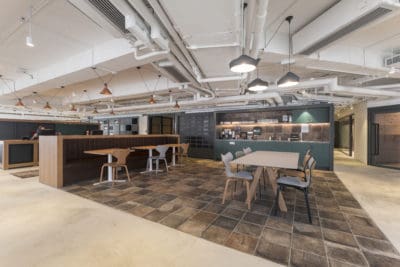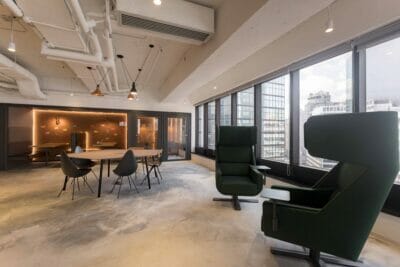
Regus Nathan Road is located in Mong Kok, and covers two floors.
Picture an office. You’re probably thinking of linoleum, green walls and a gloomy atmosphere that you need to travel down a congested motorway to get to, day in, day out. But a workspace can, and should, be so much more. As employees, people are influenced by their surroundings more than they or their employers may realise. The environment – and its convenience and accessibility – can influence everything from productivity to how we collaborate. Increasingly, workers are demanding more from their workspace.
Flexible working accommodates workers’ needs in innovative ways – and employees are turning to such specialist workspace providers to get the most out of their work environment.
It’s all part of the workspace revolution. And it’s happening right now.
How the Revolution Started
Recently, social and economic trends have reshaped our ideas on the modern office and given rise to this revolution. Rapid advances in technology and hyper-connectivity, as well as the desire for a greater work-life balance and more homelike work environments, started the shift. The strategic and financial benefits of a flexible workspace model gave it fuel.
Technology has liberated workers from their desks – cloud computing, conferencing platforms, video calling, and the like has given the workforce more mobility.
Flexible, modern co-working offices provide options to businesses and employees looking for a better environment. Even if for just a few days every week, individuals can benefit from mixing up their surroundings by using a versatile, comfortable workspace. Flexible workspace providers are also better positioned to create the varied and exciting environments people crave, whereas a freelancer or company may not have the resource or experience to create these spaces.
In practical terms, flexible workspace can mean travelling to clients, wherever they may be, and finding ready-to-use offices, co-working areas and meeting spaces at your disposal.
Leading the Workspace Revolution
It’s this complete liberation that makes it no surprise flexible workspace organisations like Regus have clients operating across a huge variety of industries, in nearly every country.
Part of the IWG Group, Regus is the world’s largest provider of flexible workspace, with customers including some of the most successful entrepreneurs, individuals and multi-billion-dollar corporations.
An infrastructure to support every business opportunity, they have an unparalleled network of office, co-working and meeting spaces for companies to use in every city in the world. It’s a network that includes almost 3,500 business centres, spanning almost 1,100 towns and cities across 120 countries.
Through the range of office formats, as well as a growing mobile, virtual office, and workplace recovery services, Regus enables people and businesses to work where they want, when they want, how they want, and at a range of price points.
The benefits are clear: not only does a flexible workspace model offer more agility and encourage global growth ambitions, it’s also more profitable.
What This Means for the Property Industry
Embracing flexible workspace and partnering with Regus – the leader of this exciting revolution – offers incredible opportunities for landlords and property owners.
It offers distinct advantages to making money from traditional office deals – not least because without having to negotiate lengthy contracts, closing deals takes much less time. And of course, companies will be quicker to sign on the dotted line because there’s no commitment of capital expenditure, and leases are flexible. So, adding flexible workspace to your portfolio and offering short-term leases can help attract tenants that may have previously been uninterested.

Regus Nathan Road offers an array of beverages, with direct access to the Mong Kok MTR station.
Of course, this doesn’t mean abandoning conventional, long-term leases completely. But rather, by adding flexible workspace to your portfolio you provide companies with the option to access the space they need, exactly when they need it.
Much of the growth that exists in the market is coming not from traditional procurers of offices, but from providers of shared working spaces. And having flexible workspace has ramifications far above a single building – it can boost an entire portfolio, revitalise real estate within a larger area, and be a key perk for businesses nearby. As well as meeting the needs of companies and staff alike, a vibrant co-working centre with a changing cast of energetic business people will have knock-on benefits for the surrounding community and land-use – whether that be retail or longer-term office lets.
The Importance of Making the Change Now
So, it’s clear there are many benefits of joining the workspace revolution and partnering with one of the leading providers, like Regus, but it seems there’s no time to linger; unless you want to suffer the consequences of not diversifying with the evolving property landscape.
For decades, one of the biggest markers of prestige for a business was its property – but this idea is changing. In 2017, JLL released a report saying 30 per cent of corporate real estate would comprise flexible workspace by 2030. In the same year, CBRE released its own report about flexible workspace, stating 71 per cent of occupiers believe they are vital to delivering corporate real estate objectives, and the flexible office market is growing at 13% a year. As a result, the ever-decreasing number of businesses using the traditional model is rendering big, sole-occupancy office buildings little more than a relic of a bygone business era.
There’s no denying that the property industry is at a tipping point, with mobile workers leaving a significant proportion of traditional, fixed office space obsolete. As more and more people work remotely for at least part of their week, it’s becoming more apparent that there’s a clear and obvious choice to make – join the flexible workspace revolution or find yourself with empty desks and empty spaces.
This sponsored feature is contributed by Regus, the world’s largest service office provider. To find out more about the benefits of partnering with Regus, call +852 2166 8000, visit www.regus.hk or download the app.

Leave a Reply